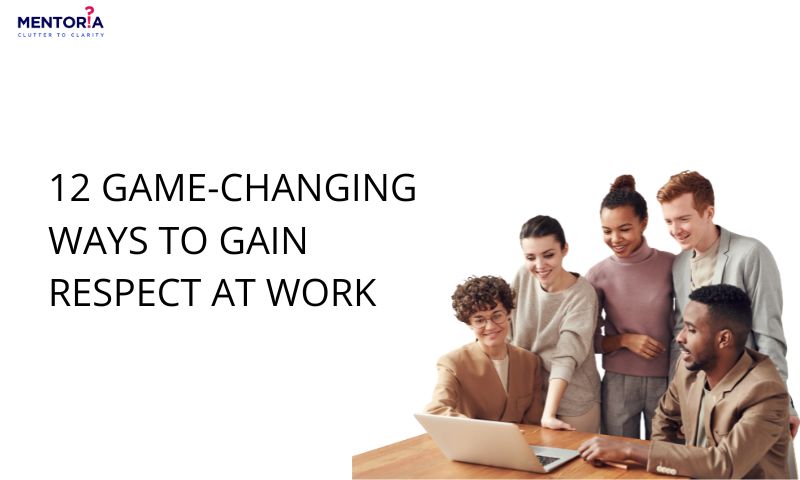12 Game-Changing Ways To Gain Respect At Work

Ever felt like there’s this mystical aura surrounding true professionalism, and you’re just trying to figure out the secret handshake? Well, spoiler alert: it’s not about acing a covert handshake, but rather nailing down some key behaviours that can either make you a workplace legend or, well, not so much.
So, in this blog, we’re about to decode the 12 game-changing behaviours that can turn you from a mere job-doer into a professional powerhouse. These aren’t just the usual office etiquettes; we’re talking about the kind of behaviours that make colleagues do a double-take and go, “Now, that’s someone who means business.”
So, let’s delve into these behaviours and explore the path to becoming a respected professional.
12 Game-Changing Traits
Procrastination: The Credibility Killer
Procrastination might seem like a harmless habit, but in the world of work, it’s a silent credibility killer. When you constantly push tasks to the last minute, it doesn’t just affect you; it sends a message to your colleagues and superiors that your reliability is questionable. Imagine this: a team member who’s always racing against the clock, producing rushed work, missing deadlines – it doesn’t exactly scream professionalism. To kick this habit, start breaking tasks into smaller, manageable chunks. It not only makes the workload more digestible but also allows you to approach your work with a sense of purpose and control.
- Time Blocking: Schedule dedicated blocks of time for specific tasks to avoid the urge to procrastinate.
- Prioritisation: Identify and tackle high-priority tasks first to alleviate the pressure of looming deadlines.
- Accountability Partner: Share your goals with a colleague or friend who can help keep you accountable and on track.
Oversharing: Balancing Friendliness And Professionalism
The fine line between being friendly and oversharing can be a tricky tightrope to walk. In the pursuit of fostering a friendly work atmosphere, it’s easy to veer into sharing too much personal information. The key here is finding that sweet spot where you connect with colleagues on a personal level without compromising your professional image. It’s not about building a fortress around your personal life; it’s about establishing boundaries that command respect while allowing genuine connections to flourish.
- The 80/20 Rule: Strive for an 80/20 balance – 80% professional, 20% personal – in your interactions.
- Read the Room: Gauge the comfort level of your colleagues before delving into personal anecdotes.
- Body Language Awareness: Pay attention to non-verbal cues to ensure you’re not making others uncomfortable.
Negativity: The Contagious Energy Drain
Negativity is like a dark cloud that hovers, affecting not only your mood but the entire workplace atmosphere. The psychology here is fascinating – studies show that being exposed to a negative person can drain your mental energy. In a professional setting, constant complaining or focusing on the downside of things can create a gloomy aura. Flip the script by cultivating an attitude of problem-solving and optimism. Not only does this improve your own experience at work, but it also positively influences how your colleagues perceive you.
- Gratitude Journaling: Cultivate a habit of jotting down things you’re grateful for to shift focus from negativity.
- Solution-Focused Conversations: Instead of dwelling on problems, steer conversations toward potential solutions.
- Positive Reinforcement: Acknowledge and celebrate small wins to foster a culture of positivity.
Being Unprepared: A Recipe For Unprofessionalism
Imagine entering a meeting without a clue about the agenda or presenting a project without essential information – it’s a recipe for unprofessionalism. Being unprepared not only affects your own performance but also sends a signal that you don’t take your work seriously. The psychology at play here is intriguing; being prepared communicates respect – for your time, your colleagues’ time, and the work itself. Take the time to thoroughly understand your tasks and prepare for meetings in advance, and watch how it transforms perceptions about your commitment and professionalism.
- Checklists: Create task checklists to ensure nothing is overlooked in your preparation process.
- Anticipate Questions: Preemptively address potential questions or concerns related to your tasks or presentations.
- Mock Presentations: Practice presentations or discussions to boost your confidence and level of preparedness.
Lack Of Punctuality: Time Is Respect
Punctuality is often underestimated, but its impact on how you’re perceived at work is profound. It’s a clear sign of respect for other people’s time and commitments. Consistently arriving late to work or meetings can raise doubts about your dedication and professionalism. The psychology behind punctuality is simple – it shows that you take your responsibilities seriously. Prioritise being on time, and witness how it positively influences your professional image and relationships.
- Set Alarms: Use alarms or reminders to ensure you leave with enough time to spare.
- Early is On Time: Cultivate a mindset where arriving a bit early is the norm, signalling reliability.
- Communication: If you’re running late, communicate it in advance to show respect for others’ time.
Not Acknowledging Others’ Efforts: The Power Of Recognition
In the psychology of workplace relationships, acknowledgment and appreciation play starring roles. Failing to acknowledge others’ efforts, big or small, can create an atmosphere of resentment and undervaluation. It’s the little words of appreciation that often make the most significant difference in a workplace. The act of recognising others is a powerful tool in building positive relationships and fostering a healthy work environment.
- Public Acknowledgment: Recognise achievements in team meetings to amplify the impact of your appreciation.
- Personalised Recognition: Tailor your acknowledgment based on individual preferences for a more meaningful impact.
- Team Celebrations: Organise small celebrations to collectively appreciate accomplishments and milestones.
Avoiding Feedback: Embrace Growth Opportunities
Handling criticism is never a walk in the park, but avoiding feedback is a surefire way to stunt your professional growth. The psychology here is intriguing – embracing feedback, even when it’s tough to hear, signals a willingness to learn and grow. It’s a demonstration of professionalism and maturity that garners respect in any work environment.
- Feedback Journaling: Document feedback received and reflect on areas for improvement.
- Feedback Seeking: Actively seek constructive feedback to proactively address potential areas of development.
- Implementing Feedback: Show a commitment to growth by incorporating feedback into your work and actions.
Gossiping: The Reputation Deteriorator
Ah, office gossip – the tempting pitfall we’ve all hovered around. Engaging in workplace gossip might seem harmless, but it’s a quick way to erode your professional reputation. Gossiping shows a lack of respect for others and can create an untrustworthy image of you. Picture this: every bit of juicy gossip contributes to an unspoken narrative about your trustworthiness. Instead of being the go-to source for office rumours, focus on building positive relationships based on trust and mutual respect.
- Stay Solution-Focused: Redirect conversations towards problem-solving rather than dwelling on others’ shortcomings.
- Be Mindful of Tone: Be cautious of your tone, ensuring that your words aren’t misconstrued or contributing to negativity.
- Celebrate Others’ Success: Shift the focus from gossip to celebrating the achievements of your colleagues, fostering a positive environment.
Avoiding Responsibility: Stepping Up For Success
The allure of passing the buck is strong, especially when faced with daunting tasks. However, avoiding responsibility is a surefire way to lose respect at work. Imagine a workplace where everyone dodges tasks – chaos ensues. It’s time to step up, take ownership of your tasks, and follow through on your commitments. Embrace challenges as opportunities for growth. Sure, it might be challenging at times, but in the long run, it pays off in spades.
- Break Down Tasks: If a task seems overwhelming, break it down into manageable steps for easier execution.
- Collaborate: Seek support from colleagues when needed; collaboration often leads to better outcomes.
- Celebrate Achievements: Acknowledge and celebrate the successful completion of tasks, reinforcing a sense of accomplishment.
Neglecting Your Appearance: The Visual Communication
While we champion the importance of skills, neglecting your appearance can inadvertently send the wrong message. Dressing appropriately and maintaining personal hygiene is a form of visual communication. It’s not about following the latest fashion trends or donning expensive attire; it’s about showing respect for yourself and those around you. A professional appearance communicates that you take your role seriously and adds a layer of credibility to your character.
- Understand Dress Codes: Familiarise yourself with the workplace dress code and adhere to it.
- Grooming Matters: Pay attention to personal grooming; a polished appearance enhances your professional image.
- Adapt to Occasions: Adjust your attire based on the nature of meetings or events, showcasing adaptability.
Failing To Show Empathy: Human Connections Matter
Workplaces are more than just hubs of productivity; they’re communities of people with diverse experiences and challenges. Failing to show empathy towards your colleagues during tough times not only affects your relationships but also paints you as someone who doesn’t value their emotions. Actively listen, show understanding, and offer support where you can. This not only earns you the respect of your peers but also fosters a supportive and caring work environment.
- Check-In Regularly: Regularly check in with colleagues to understand their well-being.
- Offer Assistance: Extend a helping hand when colleagues are facing challenges, showing genuine care.
- Create a Supportive Culture: Encourage a culture of empathy within your team, promoting open communication.
Lack Of Respect For Others: The Golden Rule At Work
In the grand symphony of workplace dynamics, the golden rule reigns supreme – treat others as you would like to be treated. Disrespecting your colleagues or superiors, consciously or unconsciously, can severely damage your professional image. Remember that everyone deserves respect, irrespective of their role or position. Showing respect fosters a positive work environment and encourages healthy communication. On the flip side, a lack of respect can lead to conflicts and a toxic work atmosphere.
- Practise Active Listening: Truly listen to others during conversations, acknowledging their perspectives.
- Acknowledge Diverse Contributions: Recognise and appreciate the unique strengths each team member brings to the table.
- Be Open to Feedback: Create an environment where feedback is encouraged, promoting mutual respect.
Self-Awareness as the Cornerstone
Becoming a respected professional isn’t an overnight transformation. It begins with self-awareness – understanding how your behaviours influence others. Each action and word contribute to the impression you leave. The journey to professionalism requires conscious effort, consistency, and a commitment to embodying these 12 game-changing traits. So, embark on this path with intention, and watch your professional image reach new heights.
Mentoria is your strategic ally in this! We understand the nuances of corporate success and offer tailored guidance through our corporate and business workshops. Kick-start your transformation with Mentoria, where we prioritise your unique needs. Our experienced mentors are just a call away, ready to engage in insightful conversations to identify the perfect plan for your individual goals. Whether you’re honing specific skills, navigating office dynamics, or seeking advice on adopting the traits that command respect, Mentoria is your go-to partner.










